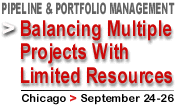 
 Download Brochure
Download Brochure
(PPM2001.pdf - 641 kb)
|
Post-Conference Mini-Workshops
Wednesday, September 26
1:00pm - 2:30pm
Bonus!
You may choose one of the following two 90-minute sessions to
focus on deployment of new techniques upon return to your
organization. While less comprehensive than the pre-conference
workshops, they nonetheless provide practical implementation
ideas. These workshops are offered at no additional charge,
pre-registration is required to guarantee your place.
Option #1:
Real Benefits in Only 60 Days:
A Non-Threatening, Incremental
Approach to Critical Chain Project
Management Implementation 
In
this workshop, you will learn a common-sense Critical Chain
Project Management (CCPM) implementation approach that is
direct, non-threatening and incremental. It has been
successfully applied from small to huge product development
organizations. This approach will not only appeal to "early
adopters," but it has the potential to allow CCPM to "cross the
chasm" so that the vast majority of product development
organizations can use CCPM to deliver quality products very
quickly without sacrificing content or adding development staff.
Some things that you will learn
in this workshop are:
- The 2 keys to a successful CCPM implementation.
- The 3 disciplines that you must acquire to be the best.
- The "old-fashioned" method that is the foundation for
CCPM.
- The role of communication in excellent project execution.
- How to create urgency and focus without causing burn-out
and frustration.
Since 1997, Eugene Kania
has been an internal management consultant at Lucent
Technologies pioneering the use of Critical Chain Project
Management (CCPM) in New Product Development (NPD). Mr. Kania,
who recently left Lucent to help other companies gain the
benefits of CCPM, is a certified Jonah from the A.Y. Goldratt
Institute (AGI), the founding organization of the Theory of
Constraints (TOC), as well as an expert in CCPM and other TOC
Methods.
Option #2:
Integrating Process Management with Program Management: How to
Achieve Cross-Functional, Concurrent Product Development 
This
session will focus on how to establish a process framework to
guide development projects and determine roles and
responsibilities. It will cover the maturity gates and formal
reviews that control progress of new products through a life
cycle, as well as sub-processes that re-engineer the product
development process into a cross-functional, concurrent
approach.
A special focus will be on implementation issues. What
attributes should the leader possess? Where should he/she look
for support? How should the team be organized? What is the first
order of business for the project team? How do you implement
cross-functional teams and consensus decision making? What do
you do about individuals who try to sabotage change?
Case studies will highlight the five pitfalls typical PD
projects face -- you will learn how to overcome them and develop
strategies to ensure success.
Stephen Armstrong,
Principal, AMGI, is uniquely qualified to talk about this
subject. An apprenticed trained tool maker/manufacturing
Engineer, Professional Engineer, and Certified Management
Consultant, he has headed AMGI, a Toronto based consulting
practice for seven years. He has led many of the world’s leading
aerospace companies to successfully implement Collaborative
Product Development – including managing the politics required
to transfer ownership of the new system. |
|

